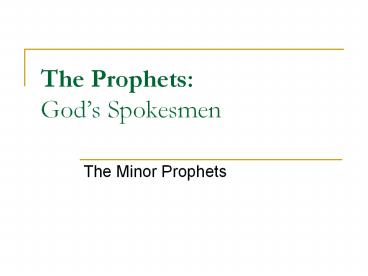The Prophets: God’s Spokesmen - PowerPoint PPT Presentation
1 / 19
Title:
The Prophets: God’s Spokesmen
Description:
The Prophets: God s Spokesmen The Minor Prophets Jonah c. 785-750 (Jonah 1:3 & 17, 2:2, 3:10) The book of Jonah is a narrative. Jonah is swallowed by a large fish ... – PowerPoint PPT presentation
Number of Views:54
Avg rating:3.0/5.0
Title: The Prophets: God’s Spokesmen
1
The Prophets Gods Spokesmen
- The Minor Prophets
2
Jonah c. 785-750 (Jonah 13 17, 22, 310)
- The book of Jonah is a narrative.
- Jonah is swallowed by a large fish and spit up on
dry ground contrasts Jonah's limited view of
guilt and judgment with Yahweh's concern for all
people, even for Israel's enemies.
3
Historical Background 930-700 BC
- Ten tribes split off from the Kingdom Israel to
create the northern Kingdom of Israel and the
southern Kingdom of Judah (c. 930 BC). - Judah, had Jerusalem as its capital and was ruled
by King Rehoboam (Solomons son). - In 722 BC the Assyrians the northern Kingdom of
Israel, destroyed its capital Samaria and sent
the Israelites into exile and captivity.
4
(No Transcript)
5
Amos c. 750 (Amos 24, 37, 914)
- Prophesied in Israel, the northern kingdom.
- He challenged popular ways of thinking about the
Day of Yahweh. - It will be a day of judgment, a time when God
punishes Israel and its neighbors for their
social and economic abuses. - Amos claimed that Israel had perverted the
worship of God into a worthless exercise of
ritual.
6
Hosea c. 740-730 (Hosea 12, 223, 66, 142-4)
- Hosea claimed that Israel's worship of Baal was
like marital infidelity. - He continued Amos' claim that Israel's social and
economic injustice deserved severe punishment,
even devastation of the nation. - Still, Hosea emphasized Yahweh's devoted
commitment to Israel's well-being.
7
Micah c.730-701 (Micah 39-12)
- Micah was a rural villager in Judah. He denounced
the rich landowners who oppressed the rural
farmers. - He warned that the temple in Jerusalem would be
destroyed.
8
Section 2 The 7th Century decline of Assyria and
rise of Babylon
- Over the course of the next 90 years, the
Assyrian Empire began to decline and the
Babylonian Empire gained in power, conquering
many of the Assyrians territories.
9
(No Transcript)
10
Zephaniah 630-622 (Zephaniah 118, 23, 317)
- The book of Zephaniah was compiled at the time of
Josiah's reign in Judah. - The book begins by declaring Yahweh's intention
to "cut off humanity from the face of the earth"
(13), but in the middle of chapter 3 changes
tone to announce that "The Lord has taken away
the judgment against you" (315). - This is thought to be due to King Josiah's
repentance.
11
Nahum(Nahum 17, 114a, 115a, 213a, 319)
- Nahum rejoiced over the fall of Assyria shortly
before its capital at Nineveh was destroyed.
12
Habakkuk(Habakkuk 12, 15,112, 32, 319)
- With the Babylonians to soon conquer Judah,
Habakkuk questioned God's fairness, but concluded
that the righteous person must have faith in
God's justice.
13
Section 3 The 6th Century Babylonian Exile
- In 607 BCE the nation of Judah was conquered by
Babylon. As prophesied, Jerusalem and its temple
was sacked and burned, and most of the Jews were
carried away to live in captivity. This exile
would last about 70 years.
14
Obadiah(Obadiah verse 4, 12, 15)
- Obadiah condemned Edom for its role in helping
the Babylonians as they crushed Jerusalem. - The Edomites are the descendants of Esau.
15
Section 4 The Late 6th Century the Restored
Judean Community
- About 70 years later, in 537 BCE, the Persians
(who had conquered Babylon in 539 BCE) allowed
Jews to return to Jerusalem and rebuild the
Temple. - It wasnt long however, before the Israelites
returned to their sinful ways, and corruption
among the Priests and Pharisees once again took
hold.
16
Haggai(Haggai 14-6, 29)
- Haggai prophesied at the time of Zerubbabel, a
descendant of David whom the Persians appointed
as governor of Judah (which was now a province of
the Persian Empire). Haggai urged the restored
community to rebuild the temple of Yahweh in
Jerusalem saying that Yahweh would bring the
wealth of the nations to the city if the
community would complete this task.
17
Zechariah(Zechariah 13, 713, 99, 139)
- Zechariah lived at the same time as Haggai.
- He reported a series of 8 visions encouraging the
returned exiles to rebuild Jerusalem and its
temple and rely on Yahweh as they awaited the
restoration of the Davidic line of kings.
18
Joel(Joel 14, 225, 228)
- The book of Joel contains a set of apocalyptic
visions. With striking imagery Joel speaks of
plagues and other divine judgments signaling the
coming of the Day of Yahweh. Joel calls for
repentance and pictures a future time when the
spirit of God will be poured out on all people.
19
Malachi (Malachi 16, 36-7)
- Malachi wrote the words of the Lord to Gods
chosen people who had gone astray, especially the
priests who had turned from the Lord. - But in spite of the peoples sin and turning away
from God, Malachi reiterates Gods love for His
people and His promises of a coming Messenger.































